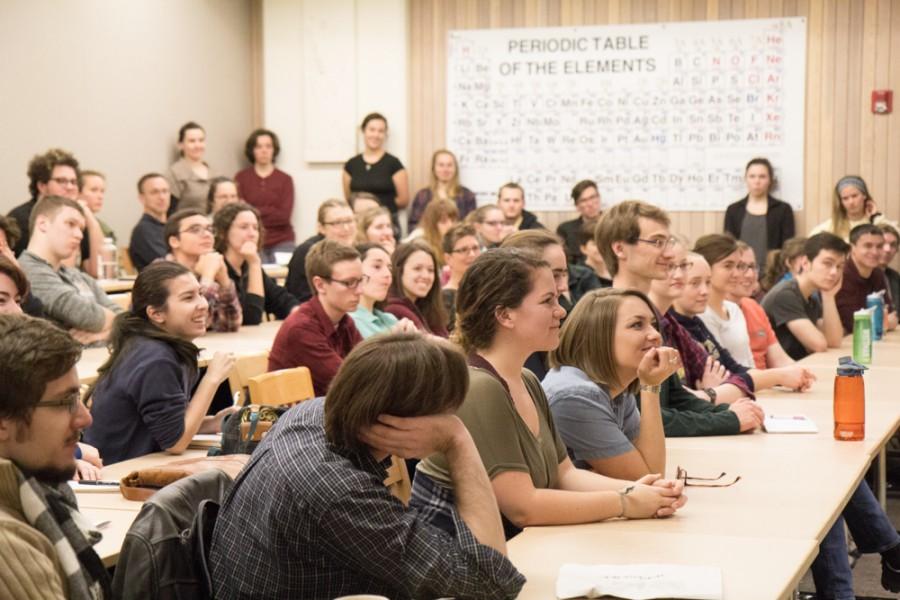Speak Up and Act Out at Power and Privilege
Photo by Marra Clay
February 25, 2016
Whitman students and faculty participated in the annual Power & Privilege Symposium again last week. The event began with a keynote address on Feb. 17 by Connie Rice and continued the next day with presentations and a screening of the 2015 indie film “Tangerine.” The event was created to encourage discussion surrounding power, privilege and other important topics that students want to address or discuss on-campus.
The first iteration of the Symposium was hosted in 2006 after two students wore blackface to a party, and that event focused largely on race. However, the event in its current format began in the spring of 2013, when the faculty voted that classes should be cancelled for the day so that students may attend the Symposium. Now, the Symposium consists of four different sessions throughout the day, with presentations on a variety of topics being held across campus that students can attend. 
“There are so many identities and forms of oppression that intersect,” said first-year Danielle Hirano. “[S]o to have all of the issues, thoughts, and conversations that those people talk about on a daily basis, and deal with on a daily basis, to be brought to light for one day and for other college folks to be exposed to what other people go through…is really great.”
The Symposium saw an average of 42 percent of the Whitman community in attendance per session, which is consistent with the number for last year. However, the Symposium reached a new high for attendance at a specific session, with 50 percent of the 2,000-member community attending a presentation during the third session.
Though attendance is not mandatory for the Symposium, classes are cancelled to encourage both students and faculty to attend the event. Nevertheless, some may have homework, lab work, or other commitments that they prioritize instead of attending the Symposium. Additionally, some may only attend a few sessions, but not the whole event.
“While 42 percent of a group of close to 2,000 is a huge accomplishment, it is nowhere near a hundred percent. There are many reasons not to attend the Symposium, but classwork deadlines, required lab research and work-study jobs should not be one of those reasons,” said Samantha Grainger Shuba, Marketing Director for the 2016 Power & Privilege Symposium. “While I recognize that we are all adults, and no one should be forced to attend the Symposium, I do hope that people recognize how fortunate we are to put on an event of this caliber every year. I hope that those who did not attend will reconsider for the 2017 Symposium.”
The keynote speaker for this year was civil rights lawyer and founder of The Empowerment Project, Connie Rice. During both the keynote speech and in a presentation on activism during the first session, she spoke about her work improving low-income neighborhoods in Los Angeles and working with the Los Angeles Police Department to decrease crime and benefit disadvantaged communities.
Whitman and the Power & Privilege Symposium also hope to keep conversations about social justice issues active on campus through Continuing the Conversation, a weekly conversation that is held in the Glover Alston Center on Friday during lunchtime.
“These conversations should be a part of our everyday conversations and shouldn’t be designated to this one day…You can’t put that pressure [of having these conversations] on a select few people to have the Symposium, it’s on you to have the conversation and it’s on you to be critically aware of social justice situations even if they don’t affect you,” said junior Anna Zheng, the Executive Director of the 2016 Symposium.
Though the overall structure of the Symposium was the same as last year, there was a change in the planning of the Symposium this year–bringing in an event director to organize the presentations. Senior Olivia Hagel, who is currently the Whitman Events Board chair and has organized many events for them, was brought in as the logistics director to apply her experience organizing large-scale events to the Symposium.

Another addition to the Symposium this year was a 24 hour prayer tent put up by the Whitman Christian Fellowship in the amphitheater. Though the tent was not sponsored by the Symposium, it worked alongside with the Symposium as a way to incorporate prayer and faith into conversations around race and power in society. Whitman Christian Fellowship leaders and students took shifts throughout the 24 hours to continually pray and reflect on the Symposium.
The Symposium marked the release of the campus climate survey, which is a survey that hopes to understand current attitudes and behaviors of faculty and students within the institution. Throughout the Symposium, students and faculty encouraged all members of the Whitman community to take the survey.
“I think this is a super important historical moment because Whitman is realizing that students have experiences at Whitman and it’s a good opportunity for students to speak up and act out and talk about their experiences,” Zheng said.
The Symposium overall aims to encourage students and faculty to think about issues that they may not normally consider, to discuss issues that affect the community and, more importantly, to continue the conversation beyond the day of the Symposium.
“I hope that people continue to realize that issues of power and privilege pervade most corners of society, and one Symposium is not going to solve them, but it’s a start. The Symposium hopefully sparks a continued interest in issues of inequity and systems of power, but one day of conversations is not enough. The conversation starts here, but continues when members of our community approach each other with something as simple as ‘I’m confused, will you help me understand?’” Grainger Shuba said.





